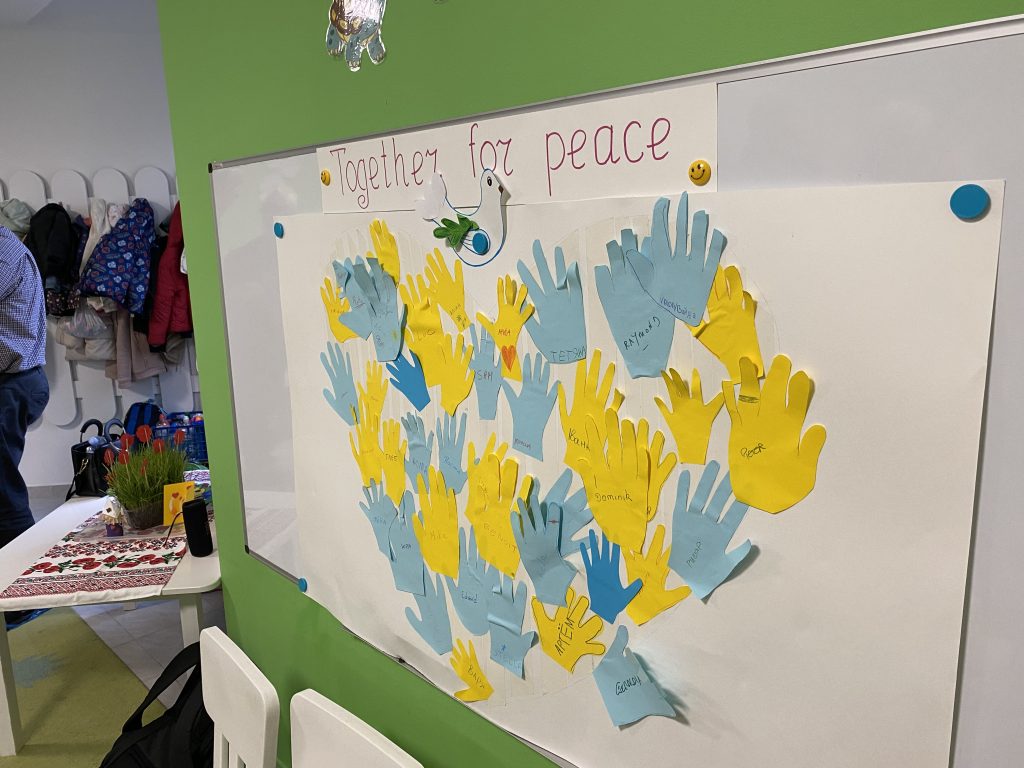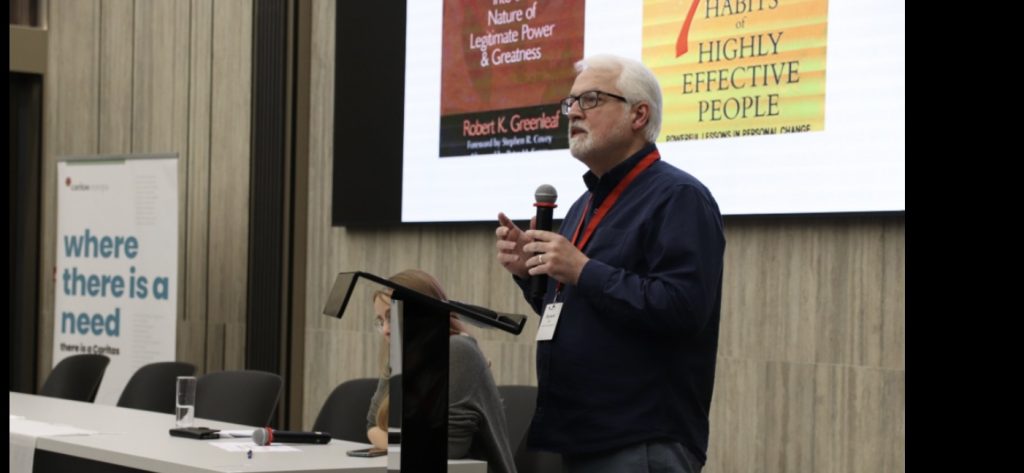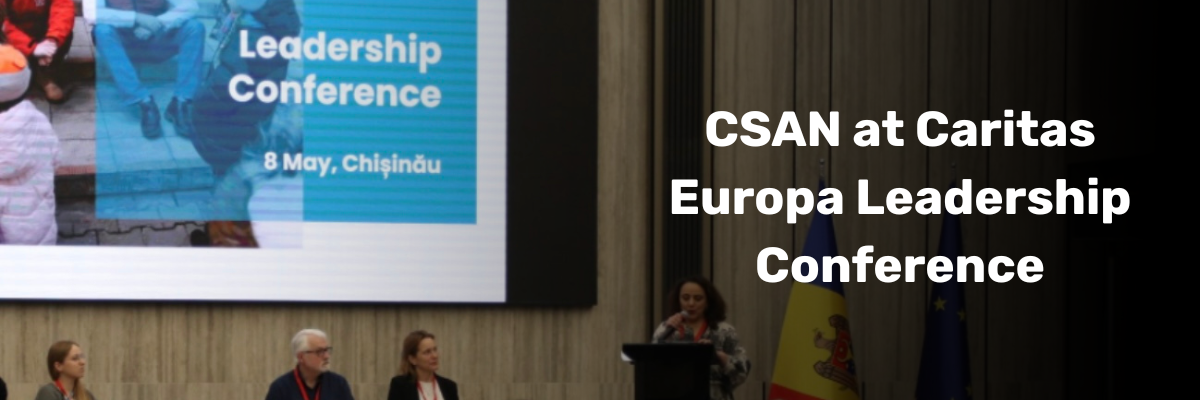On Wednesday 7 May, delegates who had arrived in Chișinău ahead of the opening of the Caritas Europa Regional Conference the following day were taken by colleagues from Caritas Moldova to visit some of their centres.
Perhaps the most moving was a visit to a kindergarten for Ukrainian refugee children. In the spirit of encounter, we sang together and drew around each other’s hands to make a solidarity display for peace. We met their mothers later and a grandmother who told us through tears that she just wanted peace.
Moldova shares a border with southern Ukraine and at the beginning of Russia’s full-scale invasion, many thousands of Ukrainians fled across the border into Moldova, which has a total population of 2 million people. As we saw in the Caritas soup kitchen for the elderly, the country struggles to maintain a level of pensions for the elderly to protect them from poverty, yet still they opened their hearts to the Ukrainian refugees.
Our encounters with the Ukrainian refugees and those who provide support for them highlighted the complexity of this work. There is of course the basic human needs of food and shelter and community, but in so many cases there are medical and psychological needs to be attended to, with people experiencing trauma, on top of any pre-existing needs. Such work requires compassion, but also expertise. If you like, a compassionate professionalism.
The following day, Monsignor Michael Landau, President of Caritas Europa, opened the Regional Conference by congratulating Caritas Moldova on its 30th anniversary of making God’s love real in their country. As we were still mourning the loss of Pope Francis, Msgr Landau paid tribute to the late Holy Father and his constant encouragement to us to live out the Gospel at the margins and be tireless advocates for people who are poor, speaking out against the divisive and hate-filled rhetoric which has been on the rise in Europe in recent years.
We heard from Alistair Dutton, the Secretary General of Caritas Internationalis, who reminded us that the President of Caritas Internationalis, Cardinal Kikuchi, Archbishop of Tokyo, was at that very moment, in conclave with the college of cardinals in the Sistine Chapel in Rome to elect a successor to Pope Francis. We were beginning to check our phones for the white smoke!
Alistair also reminded us of the perilous state of the world’s geopolitics and the immediate impact of the cuts to overseas aid by the new American administration led by President Trump. It wasn’t just in America, but many other countries had reduced their aid budgets – by an estimated 80 billion dollars worldwide – often in order to spend more on arms. This has led to many more people throughout the world being in desperate need, but for Caritas leaving isn’t an option. In this Jubilee Year, Caritas Internationalis is leading a campaign – Turn Debt into Hope – to cancel burdensome debts on poorer countries, which are more expensive than the debts of richer countries, and often divert funds from education, health and infrastructure. To find out more about the campaign and sign the petition, visit: https://www.caritas.org/turn-debt-into-hope/
We then moved into a focus on leadership, with workshops on youth and women leadership, which will increasingly shape the leadership of the future. There was a presentation on servant leadership led by Raymond Friel, CEO of Caritas Social Action Network and Agnieszka Zarzynska, Senior Social Innovation Officer for Caritas Europa. Raymond presented some new thinking on the Ten Habits of Gospel-Inspired Servant Leaders, while Agnieszka gave a compelling reading of St Paul’s engagement with the first Christian community in Rome, as a model of attentive servant leadership.
That evening, at the end of Holy Mass in the Catholic cathedral in Chișinău, led by Bishop Anton Cosa, who founded Caritas Moldova thirty years ago, we heard the words we had been waiting for: habemus papam! The excitement was palpable as we made our way to dinner, checking our phones for the first appearance on the balcony of St Peter’s of the new pope. Sitting together at table, the first pictures came through of Pope Leo XIV.
There was more than one tearful eye, as colleagues translated from Italian some of the first words of the new Holy Father, clearly in a line of continuity with Pope Francis, but without doubt with his own style.
From the balcony we heard Pope Leo say: “We want a synodal Church, a Church that walks, a Church that always seeks peace, that always seeks charity, that always seeks to be close, especially to those who suffer.” We toasted the health of Pope Leo!
The following morning, we started the final day of our conference with a prayer for the Holy Father. We heard again from Alistair Dutton, who reminded us that Pope Leo, while he was a Bishop in Peru, was on the board of Caritas Peru.
We were reminded that the previous Pope Leo, the 13th, was the pope who championed the dignity of the workers and gave us the first encyclical of the social teaching of the Church, Rerum Novarum, in 1891.
We saw a video clip of our new Holy Father speaking in an interview from October 2024 which indicated his views on leadership in the Church: “The bishop is not supposed to be a little prince sitting in his kingdom, but rather called authentically to be humble, to be close to the people he serves, to walk with them, to suffer with them, and to look for ways that he can better live the Gospel message in the midst of his people.”
It was with great hope and joy that the family of Caritas welcomed Pope Leo XIV and renewed our commitment to work with him in charity with and for those who suffer most, inspired by the Gospel. We concluded our statutory business with a spring in our step and heartfelt thanks to our warm-hearted hosts from Caritas Moldova.






You must be logged in to post a comment.